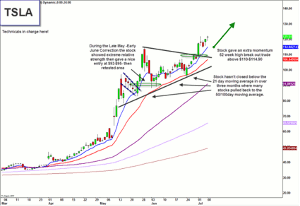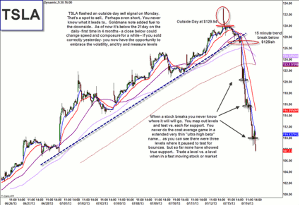In this case study, Ben Banks of T3Live.com, reviews the recent price action in a popular stock to demonstrate how one can learn to identify buy and sell patterns.
Trading “high beta" stocks that have a lot of momentum requires a quick mind, as well as quick fingers (depending on the time-frame). Trading momentum stocks can be extremely rewarding if a trader is able to time them well, but it can also be extremely risky if you do not know how to obey levels.
When trading momentum stocks, the worst thing you can be is stubborn or inflexible. When a momentum stock, such as Tesla (TSLA), flashes a caution/sell signal or a buy signal, the trader needs to be on his or her toes to react quickly. A trader can be in a lot of pain very quickly if he or she doesn't make adjustments and ask questions later. The recent action in Tesla is a good example of why you need to be on your toes with momentum stocks. Tesla has provided multiple entry signals on its way up, but that doesn't mean it will never go down. Over the last few days, Tesla flashed us signals that, at the very least, momentum may be exhausted and that a trader should take caution.
The first chart (shown below) is from a couple weeks ago. The chart explains a few of the buyable patterns that all momentum stocks show. At the time this chart was created, Tesla was showing strong momentum to the upside. Most of the time, a good way to determine if a stock is going to have momentum is if it's "riding" the eight-day and 21-day EMAs and if it's near highs showing relative strength, exactly what we saw in Tesla.
One of the cleanest buyable patterns at the time was when Tesla was bull-flagging before May 23. A bull flag in a momentum stock is usually a good pattern to enter on as flag patterns signal potential continuation. A couple weeks later, the next buyable pattern appeared on June 26 and June 28 (both entries), as Tesla had consolidated in a wedge pattern and was testing the upper range of it, poised for a breakout.
The next chart was created on July 16, a few weeks after the chart we just viewed. At this point, Tesla had just extended higher after breaking out of its last buy point near $110 on June 28 or $106 on June 26. Tesla made a new high of $133.26 before traders got a wake-up call from the price action that warned them of a potential composure change in this momentum name. This wake-up call came on July 15 as Tesla formed an exhaustion gap after an upgrade and the announcement that it would be added to the NASDAQ 100 (NDX). An exhaustion gap alone is not a death knell for a stock. In fact, sometimes it simply leads to a rest or pause (an example: May 7). However, at the very least it is a warning sign that traders should watch the stock more closely. The action on July 15 was a warning to traders, and July 16 was confirmation of a momentum shift.
The following chart is a 15-minute chart from July 16 that goes over some intraday pivots that traders were looking at for potential actionable areas that day. The chart also clearly shows the confirmation move from the warning sign we received on July 15.
The final chart we are going to examine is that of Tesla on the daily timeframe from July 16. Usually momentum stocks "riding" the eight-day and 21-day EMAs are likely going to continue in that direction and can provide great opportunities if you are able to spot the appropriate patterns. However, with momentum names, the down moves are just as fast, if not faster, than the up moves. When price action flashes a warning sign like we just talked about, it is essential for a trader to respect that and adjust appropriately. Momentum can cut both ways, and just like it is wise to be long when it is "riding" the eight-day and 21-day EMAs, when a momentum stock breaks below these key moving averages, the character of the stock immediately changes and so must the trader.
As of July 16, Tesla was "broken" and needed time to rebuild and gain upside momentum again.
With the help of some simple patterns, we can be prepared to react accordingly to when a momentum stock flashes signals that need to be watched for potential changes in pace or character.
By Ben Banks of T3Live.com












